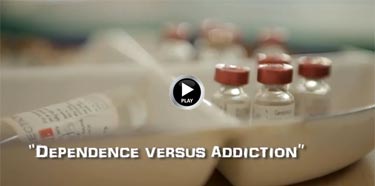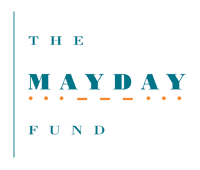The Treat the Pain & Life before Death Projects focus on the global epidemic of untreated pain and the need for palliative care. Read more / Watch All the Videos
Produced by Mike Hill & Sue Collins, Moonshine Movies
Treat the Pain Life Before Death
About this Video
'Dependence versus Addiction' describes how physical dependence is a natural physiological response to opioid medications and not addiction. read more...close
Global pain management experts illustrate why the use of opioid medications should not be feared or stigmatized. Dr Kathleen Foley (USA), Dr Jim Cleary (Australia), Dr MR Rajagopal (India), Dr Daniela Mosoiu (Romania), Mary Callaway (USA), Dr Charles Von Gunten (USA) and Dr Jay Thomas (USA) provide notable quotes:
Dr Kathleen Foley (USA) explains; “Patients chronically taking opioids will become physically dependent, but that’s not psychological dependence or addiction. When patients with cancer taking opioids withdraw from their medications, that doesn’t mean that they’re addicts, it means they’re in withdrawal because they’re physically dependent.”
Dr Jim Cleary (Australia) identifies that dependence is a normal physical response where the body is signaling that it needs certain medicines. By contrast, “Addiction and the psychological dependence we talk about is when people start craving these drugs and continue to use them despite documented harm.”
Physical dependence is a normal response, agrees Dr MR Rajagopal (India), who expects to see some side effects during withdrawal from opioid medications. “But that’s not addiction.”
Dr Kathleen Foley provides an anecdotal patient case study to highlight the difference between dependence and addiction. “For more than the majority, I’d say ninety-five per cent of patients taking these medications, this is not about the use of these medicines for anything other than pain relief.
Dr Daniela Mosoiu (Romania) explains that the way morphine works on patients with pain is quite different to the way it works in a physically healthy and pain-free person. “It seems that pain is in a way modifying the chemistry and the way we react to opioids.”
“Research has shown that it’s an infinitesimal percentage of cancer patients that become addicted,” states Mary Callaway (USA).
Mary Callaway and Dr Daniela Mosoiu indicate that it’s a “ridiculous argument” to suggest that late stage patients in pain are becoming addicted or getting euphoric by taking medicinal opioids like morphine. “I never saw a cancer patient getting morphine and becoming euphoric,” reflects Dr Daniela Mosoiu, “They get pain relief; they get a good sleep.”
“Of the thousands of patients I’ve seen, it does not change someone,” states Dr Charles von Gunten (USA). “If it works to control their pain, they’re happy, they’re symptom free, they’re also adverse-effect free. If it doesn’t work for their pain they stop taking it. If their pain gets better, they stop taking it.”
Dr Jay Thomas (USA) provides an analogy of another medication called Beta Blockers, which are medicines used to treat high blood pressure. “It turns out when you’re on a Beta Blocker if you were to stop it cold turkey you would go into withdrawal… Many people would say that if you can go into withdrawal then you must be addicted, but that’s actually not the case, that’s a case of being physically dependent… I always tell patients, ‘I don’t think you’ve ever seen people on the street corner prostituting themselves to get a Beta Blocker to treat their blood pressure'”.
Call to Action
- Invite several of the physicians, nurses and pharmacists you know to watch this video
- Then ask them to discuss the difference between physiological dependence and addiction
- Share your experiences in the comments section below…
Supporting Resources
- Fast Fact # 068 Is it Pain or Addiction?, 2nd ed
- EPEC-Oncology Module 2: Cancer Pain Management Syllabus Page M2-13 (524 KB)
- Abuse and addiction issues in medically ill patients with pain: attempts at clarification of terms and empirical study. Kirsh KL, Whitcomb LA, Donaghy K, Passik SD. Clin J Pain. 2002 Jul-Aug;18(4 Suppl):S52-60. PMID: 12479254








Comments on 11. Dependence vs Addiction
Comments are the opinions of the individuals who post them. They are not the opinions of the faculty or staff of the Institute for Palliative Medicine at San Diego Hospice.